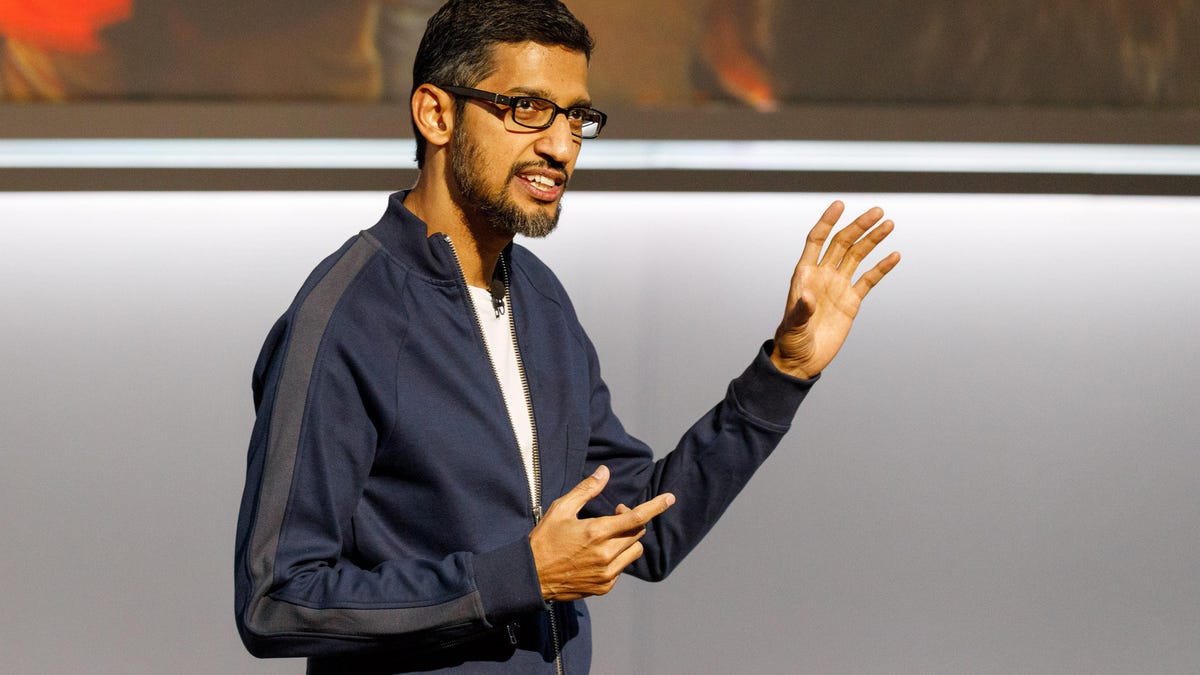Google CEO refuses to answer 'detailed questions' on China in letter to Senate
Sundar Pichai's lack of specificity is frustrating lawmakers.

Google CEO Sundar Pichai wrote a letter to senators at the end of August about the company's efforts in China.
Google CEO Sundar Pichai has sent a letter to US senators addressing their concerns about his company's efforts in China. But in it, he refused to answer specific questions about the project -- a move that's ruffled lawmakers.
The project, called Dragonfly, is the company's apparent plan to build a censored search engine for China, eight years after initially retreating from the country.
Senators, including Mark Warner, a Democrat from Virginia, and Marco Rubio, a Republican from Florida, have pressed Google for specific details, like how the product would operate or how the company would work with the authoritarian Chinese government.
"We are approaching these issues deliberately, and whether we would or could release a search service in China remains unclear," according to a copy of the letter shared with CNET by Warner's office. "Accordingly, we are not in a position to be able to answer detailed questions."
Google didn't immediately respond to a request for comment. In the past, though, Google has said it's "not close" to launching a search service in China, and any work it's doing in the country is "exploratory." The Intercept reported news of the letter earlier Friday.
On Friday, Warner chastised Google for the lack of transparency. "I was really disappointed with Google's response to our letter," he said in a statement. "Any effort to get back into China could enable the Chinese government in repressing and manipulating their citizens. Google owes us some honest answers, or it risks losing the trust of Congress and the public."
The letter from Pichai, dated Aug. 31, was sent to Warner and Rubio. But it was also addressed to Tom Cotton, a Republican from Arkansas; Ron Wyden, a Democrat from Oregon; Cory Gardner, a Republican from Colorado; and Robert Menendez, a Democrat from New Jersey. Pichai's letter was a response to an earlier missive from the senators demanding more information on the China project.
The effort has also drawn criticism from Google's workforce. A handful of employees has reportedly quit over the initiative. And about 1,000 employees signed an open letter asking the company to be transparent about the project and to create an ethical review process for it that includes rank-and-file employees, not just high-level executives.
Google has done little to acknowledge the project. However, last month, Keith Enright, Google's chief privacy officer, confirmed during a hearing with the Senate Commerce Committee that there is indeed a Project Dragonfly, but he wouldn't elaborate.
Pichai's reluctance to answer specific questions may not win over his critics in Washington.
He's been under intense scrutiny from lawmakers since last month, when Facebook COO Sheryl Sandberg and Twitter CEO Jack Dorsey testified before the Senate over election security, disinformation and the perceived biases of the companies' algorithms. Larry Page, CEO of Google's parent company Alphabet, and Pichai, CEO of Google itself, were invited, but both declined, spurring widespread anger from lawmakers.
Pichai is expected to give his own congressional testimony next month after the midterm elections.
The Smartest Stuff: Innovators are thinking up new ways to make you, and the things around you, smarter.
Special Reports: CNET's in-depth features in one place.

